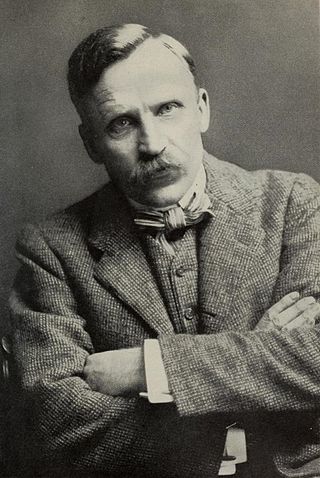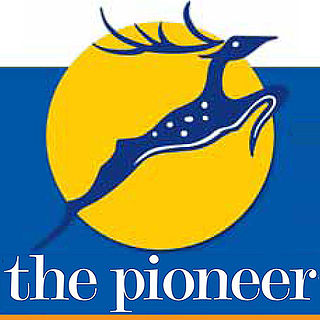
Joseph Rudyard Kipling was an English novelist, short-story writer, poet, and journalist. He was born in British India, which inspired much of his work.
This is a bibliography of works by Rudyard Kipling, including books, short stories, poems, and collections of his works.

Captains Courageous: A Story of the Grand Banks is an 1897 novel by Rudyard Kipling that follows the adventures of fifteen-year-old Harvey Cheyne Jr., the spoiled son of a railroad tycoon, after he is saved from drowning by a Portuguese fisherman in the north Atlantic. The novel originally appeared as a serialisation in McClure's, beginning with the November 1896 edition with the last instalment appearing in May 1897. In that year it was then published in its entirety as a novel, first in the United States by Doubleday, and a month later in the United Kingdom by Macmillan. It is Kipling's only novel set entirely in North America. In 1900, Teddy Roosevelt extolled the book in his essay "What We Can Expect of the American Boy," praising Kipling for describing "in the liveliest way just what a boy should be and do."

The Jungle Book (1894) is a collection of stories by the English author Rudyard Kipling. Most of the characters are animals such as Shere Khan the tiger and Baloo the bear, though a principal character is the boy or "man-cub" Mowgli, who is raised in the jungle by wolves. The stories are set in a forest in India; one place mentioned repeatedly is "Seeonee" (Seoni), in the central state of Madhya Pradesh.

Charles Eliot Norton was an American author, social critic, and Harvard professor of art based in New England. He was a progressive social reformer and a liberal activist whom many of his contemporaries considered the most cultivated man in the United States. He was from the same notable Eliot family as the 20th-century poet T. S. Eliot, who made his career in the United Kingdom.

"If—" is a poem by English poet Rudyard Kipling (1865–1936), written circa 1895 as a tribute to Leander Starr Jameson. It is a literary example of Victorian-era stoicism. The poem, first published in Rewards and Fairies (1910) following the story "Brother Square-Toes", is written in the form of paternal advice to the poet's son, John.

Juliana Horatia Ewing was an English writer of children's stories. Her writings display a sympathetic insight into children's lives, an admiration for things military, and a strong religious faith.

"Baa Baa, Black Sheep" is a semi-autobiographical short story by Rudyard Kipling, published in 1888.

Samuel Sidney McClure was an American publisher who became known as a key figure in investigative, or muckraking, journalism. He co-founded and ran McClure's Magazine from 1893 to 1911, which ran numerous exposées of wrongdoing in business and politics, such as those written by Ida Tarbell, Ray Stannard Baker, and Lincoln Steffens. The magazine ran fiction and nonfiction by the leading writers of the day, including Sarah Orne Jewett, Mark Twain, William Dean Howells, Joel Chandler Harris, Jack London, Stephen Crane, William Allen White and Willa Cather.

The Light That Failed is the first novel by the Nobel Prize-winning English author Rudyard Kipling, first published in Lippincott's Monthly Magazine in January 1891. Most of the novel is set in London, but many important events throughout the story occur in Sudan and Port Said. It follows the life of Dick Heldar, an artist and painter who goes blind, and his unrequited love for his childhood playmate, Maisie.

The Pioneer is an English-language daily newspaper in India. It is published from multiple locations in India, including Delhi. It is the second oldest English-language newspaper in India still in circulation after The Times of India. In 2010, The Pioneer launched its Hindi version in Lucknow.

Plain Tales from the Hills is the first collection of short stories by Rudyard Kipling. Out of its 40 stories, "eight-and-twenty", according to Kipling's Preface, were initially published in the Civil and Military Gazette in Lahore, Punjab, British India between November 1886 and June 1887. "The remaining tales are, more or less, new."

Howell Arthur Keir Gwynne, CH was a Welsh author, newspaper editor of the London Morning Post from 1911 to 1937.

Naulakha, also known as the Rudyard Kipling House, is a historic Shingle Style house on Kipling Road in Dummerston, Vermont, a few miles outside Brattleboro. The house was designated a National Historic Landmark in 1993 for its association with the author Rudyard Kipling (1865–1936), who had it built in 1893 and made it his home until 1896. It is in this house that Kipling wrote Captains Courageous, The Jungle Book, The Day's Work, and The Seven Seas, and did work on Kim and The Just So Stories. Kipling named the house after the Naulakha Pavilion, situated inside Lahore Fort in present-day Pakistan. The house is now owned by the Landmark Trust, and is available for rent.

The Sporting Times was a weekly British newspaper devoted chiefly to sport, and in particular to horse racing. It was informally known as The Pink 'Un, as it was printed on salmon-coloured paper.

Walter Herries Pollock was an English writer, poet, lecturer and journalist. He is best known as editor of the Saturday Review, a position he held from 1884 to 1894, but also had published various miscellaneous writings that included novels, short stories, plays, poetry and translated works between 1877 and 1920. He was also, at one time, considered one of the best amateur fencers in Great Britain.
The Civil and Military Gazette was a daily English-language newspaper founded in 1872 in British India. It was published from Lahore, Simla and Karachi, some times simultaneously, until its closure in 1963.

John Kipling was the only son of British author Rudyard Kipling. In the First World War, his father used his influence to get him a commission in the British Army despite being decisively rejected for poor eyesight. His death at the Battle of Loos caused his family immense grief.
The Kipling Society is a literary society open to everyone interested in the work and life of British author Rudyard Kipling (1865–1936). The Kipling Society focuses on Kipling and his place in English Literature, and as such attracts members from all over the world, both general readers and academic researchers.
"In the Neolithic Age" is a poem by the English writer Rudyard Kipling. It was published in the December 1892 issue of The Idler and in 1896 in his poetry collection The Seven Seas. The poem is the source of the quotation: "There are nine and sixty ways of constructing tribal lays, / And every single one of them is right."















